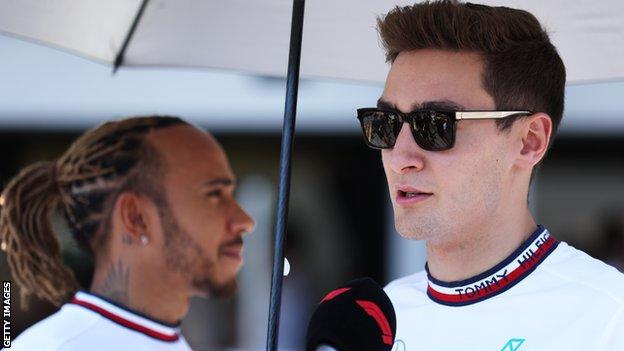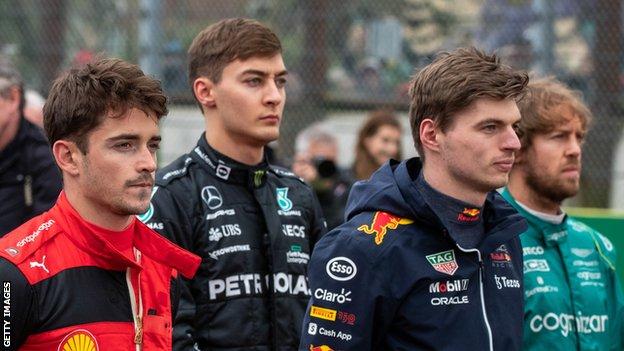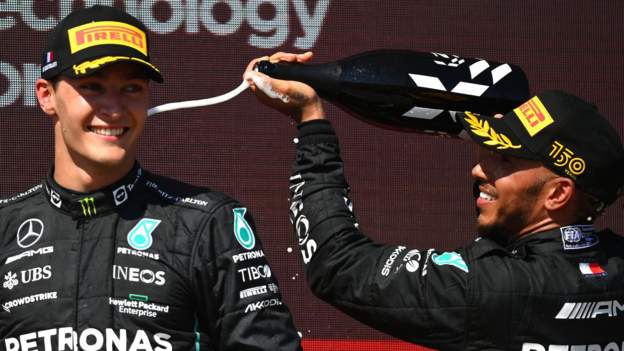
George Russell would be forgiven for feeling pretty pleased with himself.
Twelve races into his Mercedes career, he has finished ahead of team-mate Lewis Hamilton seven times, and leads the most successful driver in history by 16 points.
Russell, though, has high standards. He wants more.
“Going up against the greatest driver of all time, where do you set your expectations?” Russell ponders. “It’s by no means been a bad start to the season, but I would still like to raise my game a little bit.
“If I’m performing against the very best in sport – and I want to be the very best – I need to be at the top of my game every single week.
“I need to keep on improving. I need to look at my team-mate and see if he’s consistently doing something better. And there are certain little things that he is probably consistently better at than I am, for the time being, that I want to improve on.
“I expected no less, and I think that’s just a natural part of an athlete’s or driver’s development.”
In an extensive interview conducted at the Mercedes factory in the build-up to this weekend’s Hungarian Grand Prix, Russell is in candid and thoughtful mood on a number of topics:
- How he compares to Hamilton
- Mercedes’ difficult season
- The controversial topic of ‘porpoising’ or bouncing cars
- The ‘rat pack’ new generation of drivers
- His emergence as a ‘meme king’ on social media
- His and the team’s future
The key topic is Russell’s performance on track, and the challenge of joining a team that has won eight consecutive world championships alongside probably the toughest rival possible.
The raw statistics look good for Russell, but this has been an unusual year for Mercedes, who have found themselves with an unexpectedly uncompetitive car that had a fundamental aerodynamic instability for at least the first third of the season.
Russell knows statistical comparisons go only so far. He sees Hamilton’s data after every on-track session. And he will be equally aware that, now the team have begun to get on top of the car, and race preparations have become more normal, Hamilton has out-qualified him at three of the past four races, and finished ahead at all of them.
“The results are good on paper,” Russell says. “But I think every individual, you know if you’re performing at the top of your game or if you feel like you’ve got more to improve.
“It’s been a good start to the season, but there are definitely areas that I need to improve, and I definitely can improve, and I have been improving throughout the season.
“So I guess that’s exciting for the future. But racing drivers aren’t patient. I want to be right on top of my game today.
“My approach is to try not to look at what the others are doing too much because I truly believe that you have to to get the most out of yourself. You can’t almost copy, paste what somebody else is doing.
“I’m just going out there to try and do my own business, to do the best possible job that I can. And if I’m ahead of Lewis, great. If I was a bit behind, that’s how it is. But I still believe in myself and I believe I’ve got the potential to win championships. It’s all about the mentality you have.”
Standing out in his formative years
There is no doubting Russell’s quality, and it is no surprise he has been as good as he has since joining Mercedes this year.
Russell spent three years at Williams – from 2019 to 2021 – learning the ropes of F1. It was a time sprinkled with standout performances, none better than putting the second slowest car in F1 second on the grid – ahead of Hamilton – in the wet at last year’s Belgian Grand Prix.
And there was his one-off drive for Mercedes in Bahrain in 2020 as a replacement for a Covid-stricken Hamilton, when he was denied what would have been a breathtaking debut victory not once but twice, through two separate pieces of bad luck.
Russell looks back at his time at Williams and says the three years he spent there were “too long” as he felt ready to drive the Mercedes after “one or even two years”.
“Last year I felt ready to fight for victories and championships,” he says. “But obviously we signed a pretty watertight contract with Williams and there was no movement there so…”
I remind Russell that Mercedes F1 boss Toto Wolff asked Williams during 2020 whether they would release him for 2021, but the price quoted to terminate the contract was too high, and he decided there was no point paying it when he could have the Briton this season anyway.
Russell laughs, and says: “Well, yeah.” But he goes on to say how grateful he is to Williams for giving him the chance in F1. The team were struggling financially at the time, he says, and they chose him over Russian Sergey Sirotkin who, as Russell puts it, had “millions of dollars of sponsorship”.
Ask him what it meant to pull out those starring performances in a back-of-the-grid car, and his response is to say instead how much it meant to him to score points for the team – their first for two years – in Hungary in 2021.
It’s a reminder of the interviews he gave immediately after the race, when he was fighting back the tears, so intense were his emotions.
This is Russell through and through. Intelligent, thoughtful, realistic, genuine, mature. He knows how good he is. But he understands the bigger picture – that he is a cog, albeit a very important one, in a bigger system.
Sights on victory at Mercedes
It is an approach that has served him well this year. Russell had every right to expect to be competing for wins, only to find Mercedes had produced their worst car for 10 years.
“You can’t cry and sulk about the overall performance because that isn’t going to be productive and it’s not going to go any faster,” he says. “So you’ve got to go out and make the most of every tricky situation and be constructive – push the team in the right areas.
“The sort of journey we’re on at the moment is exciting. As soon as we recognised that we had a lot of challenges with this new car, we’ve truly just got down to the business of, ‘How do we make this car go faster?’
“We’re not trying to make it, let’s say, nicer to drive or anything. We just want to make it go as fast as possible. And what do we need to do to achieve that?
“We have, as a team, worked so hard. We’ve tried so many different things. Perhaps too many things at one point. And it’s been a challenge to analyse absolutely everything we’ve done with the short period of time we’ve had.”
Now, though, both Russell and Hamilton see light at the end of the tunnel. Hamilton has talked of his belief that the team can win races by the end of the season, and Russell agrees that is “definitely a realistic ambition”.
“I truly believe it,” he says. “The only thing we don’t know is what our rivals are going to bring to their cars. It’s relative gain. And if we find one second of lap time and they find 0.8secs, they’ll still be ahead of us.
“But there’s no reason we can’t close that gap. Whether we’ll ever have the outright fastest car this year, I don’t think so. But there will definitely be times we can fight for a victory.
“We’ve had probably two occasions where we could have fought for victory – in Silverstone and potentially in Barcelona – if things panned out slightly differently. And we are only making the car faster.
“We’re a long way from a maximum potential. So that’s why we have a bit of optimism.”
Wading into F1’s ‘bouncing’ row
Mercedes’ early season problems were rooted in a phenomenon known as ‘porpoising’ – an aerodynamic disruption under the floor that sets off a high-frequency vertical oscillation, with the car crashing into the ground, then rising before crashing down again.
Once on top of that, Mercedes discovered issues with ‘bouncing’ – a related but different kind of problem, caused by the fact the cars run low and stiff to generate best performance.
Right now, F1 is embroiled in a row over rule changes introduced by governing body the FIA aimed at addressing this matter, imposed on safety grounds, bypassing the normal rule-making procedures.
Red Bull and Ferrari oppose the changes, and are campaigning for them to be watered down, if not overturned completely.
What is rarely mentioned is the FIA’s intervention came after an official request from the Grand Prix Drivers’ Association (GPDA) for it to do so, because the drivers as a group were worried about potential long-term health effects.
Russell is one of three directors of the GPDA, along with Sebastian Vettel and chairman Alex Wurz.
“We all did a survey,” he says. “I actually haven’t seen the end result – it’s just with our lawyer and Alex Wurz, and the FIA are aware of what the outcome was.
“It’s along the lines of: ‘Is the porpoising/bouncing affecting you from a health perspective? Do you feel you have more pains after a race, compared to previous years? Is this something the FIA needs to look into?’
“I don’t know the exact figures, but I’m pretty confident the majority would have said something needs to change.”
So the drivers as a group are in favour of what the FIA is doing?
“Yeah, absolutely,” Russell says. “It is never going to be a 100% majority.
“It is clear that some teams seemingly don’t struggle as much as others, but even when you look at the race last week with Charles [Leclerc] when he went off. You listen to his on-board video going into that corner and the car is completely smashing into the ground. ‘Tch, tch, tch,’ all the way into the corner. You see his head bobbing up and down.
“Mick Schumacher had an off in the same corner in free practice, exactly the same, the car just smashing against the floor. And it’s kind of an unnecessary risk and danger we have to go through because that is the fastest way to drive the cars.”
Is Russell saying bouncing might have been a cause or contributory factor to Leclerc crashing out from the lead in his Ferrari?
“Well, it’s not going to help,” he says. “We know what the load variation was through the car, and the car was bouncing up and down by over 50% of its weight.
“So if the car is 700-odd kilos and the variation is over 400kg, you know, as a driver, you can’t control that, when it’s plus/minus 400kg every half a second entering a corner.
“As you slow down the severity gets less. But these cars are so sophisticated with the aerodynamics and if it is just bouncing around, the tyres not in contact with the ground or not as much force into the ground as it should have… I don’t know, but it does seem interesting that the two incidents in that corner for a whole weekend, both were porpoising on the entry.”
What does porpoising feel like in the car?
“It’s kind of like you’re on one of those space hoppers – that’s an extreme version,” he says. “But it’s not cushioned. Then your visibility is becoming quite difficult because you’re shaking around up and down, down the straights.
“I don’t have the answers, but it’s down to the FIA to intervene. It’s just totally unnecessary and there’s already enough risk associated with driving 200mph between the streets of Monaco, or Jeddah. Or Silverstone.”
On the younger generation
Racing politics aside, Russell is a leading light of a remarkable young generation of F1 drivers who have come to the fore in the past few years.
He, Leclerc and world champion Max Verstappen are all 24, and came up through the ranks together, just behind Alex Albon, who is rebuilding his career in Russell’s former seat at Williams, and just ahead of McLaren’s Lando Norris. Esteban Ocon and Lance Stroll, now at Alpine and Aston Martin, were also around.

Russell finds it “a bit surreal” they are all on the grid in F1 together, and says watching Verstappen and Leclerc fighting for the title “kind of feels like back in 2011-2012”.
Who’s the quickest, I ask? Russell smiles.
“I think we’ll do our talking on the track, but during the karting days we all had our fair share of success,” he says.
“In 2011, there were three main championships. The European karting championship; there was a one-off race, which was the World Cup; and then there was a secondary European Championship, called the WSK Championship. I won the European Championship, Max won the WSK one, and Charles won the one-off World Cup race. So that was quite a fun year.”
Why does he think so many drivers from the same year made it into F1?
“I was reading a book recently,” he replies, “and somebody was trying to understand why, for example, there was an era where all of the top footballers in the world came from Brazil ,or from a certain region in Brazil. Or there were some female tennis players all from a certain area in Russia who were all incredibly successful.
“And I think sometimes these things happen in packs because everybody’s pushing one another. And if you’re not being pushed, you’re never going to further yourself.
“It’s the same as me at the moment. I’m racing against Lewis Hamilton. I’ve got such an opportunity to continue to push myself. And there are only small details, but having that opportunity week-in, week-out, I will definitely be a greater driver by the end of this year than I would have been had I not been his team-mate.
“I guess, going back to when we were racing each other in go-karting, that’s exactly the same. We were all pushing each other.”
Russell says he has “enjoyed seeing the dynamic” between Verstappen and Leclerc this year, and says the latter is “an extraordinary driver” who will bounce back from his error in France.
But he adds: “There is no doubt that Max is incredibly solid and doing an exceptional job and he’s raising the bar.”
Becoming a meme king
In the past couple of weeks, Russell has found himself becoming a bit of an internet sensation.
A meme entitled ‘George Russell is the type of guy who…’ took off on social media. Russell embraced it wholeheartedly, joining in, and even posting an official Mercedes video.
He says: “One of my friends messaged me saying: ‘You’re trending on Twitter.’ And I was like: ‘Oh, God. Why am I trending? What has someone written about me now? What have I said? What have I done?'”
When he saw what it was about – he’s portrayed as a wholesome, all-round good guy, a bit straight, with an essence of ‘dad joke’ about him – he says he found it genuinely funny.
“Reading a lot of them made me feel very British, to be honest,” he says, “which I took with a lot of pride. It was funny to see some people’s perception.
“I think it got to a point where it was just anything goes and people were just going for it. But I liked it. I enjoyed seeing a bit of fun like that.
“It’s rare these days that social media brings, sort of, positivity and a bit of a laugh rather than just constant negativity and trying to bring people down.”
He admits he even looked back to see where it had started.
“These things just start from nowhere,” Russell says. “And you can never find the origin. I did search it in the early hours of it, sort of when it started trending. And I found a tweet from back in, like, April when somebody just said, ‘George Russell is the type of guy…’ And I think it was something very random and he was just tweeting it without trying to create anything.”
The future is silver
After three stunning years at Williams, and a strong start to his Mercedes career, Russell is very much a fixture of F1.
There has been no detail of how long his Mercedes contract is, and he says he and Wolff have not even discussed the future. But as someone who has been groomed for success by Mercedes since 2017, he sees himself staying where he is for years to come.
“I’m here to win,” he says. “Toto’s here’s to win. We’re all, every single person, here to win. And any contract negotiations or talks are a distraction from the performance.
“I’ve got enough confidence in the team, and in myself, that we don’t need to have these conversations yet. But obviously it was always sort of part of the plan that once we’re here, we’ll be here for the long term.
“So I’m just sort of excited, trying to build my future with the team. But for the time being we’re focused on what’s just ahead – the Hungarian Grand Prix.
“We’ve got some things we want to try and test. It’s not necessarily going bring us performance this weekend, but it’s going to give us a good idea the directions we need to go. And that’s what we’re all excited and focused about.”


